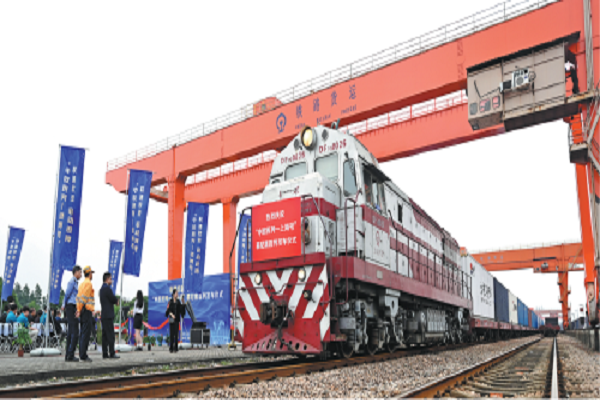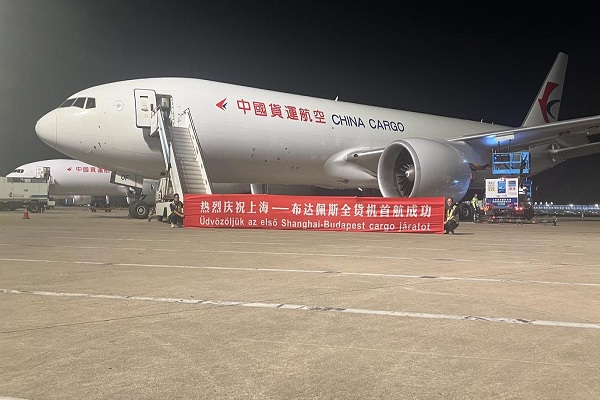Shanghai bullish on Silk Road e-commerce pilot zone
Cooperative efforts reinforce connectivity of BRI
In the wake of Shanghai receiving approval from the State Council to establish a pilot zone for Silk Road e-commerce cooperation, officials say the megacity in China will ramp up its efforts to promote the opening-up of the e-commerce sector, create a pioneering and experimental environment and support international and regional exchanges and cooperation.
According to a circular released by the State Council on Oct 23, Shanghai will take a pioneer role in making breakthroughs in reform and opening-up, aligning with international economic and trade rules and exploring institutional innovation. Additionally, greater efforts will be made to expand the opening-up in e-commerce and build a new highland for international cooperation of digital economy.
The Shanghai government said establishment of the pilot zone for Silk Road e-commerce cooperation is a key task assigned by the central government and a significant measure of China adhering to the principle of "building together and benefiting together" in the Belt and Road cooperation. It also represents an opportunity to promote the construction of Shanghai's "five centers" — shipping, trade, finance, technology and innovation, and international economy.
Zhang Xiong, deputy secretary-general of the Shanghai municipal government, said that by 2025 the city will achieve a slew of institutional opening-up results to lead development in China, gather an array of e-commerce businesses with strong international competitiveness, build a dozen regional industry clusters and establish several public service platforms to promote the development of Silk Road e-commerce partners.
Meanwhile, e-commerce transactions and international cooperation and exchanges in Shanghai will become more active, and the city's comprehensive service functions will be significantly enhanced as it provides practical experience for the development of Silk Road e-commerce.
Zhang said Shanghai's growing influence as a shipping hub, its well-established e-commerce industry and a large and fast-expanding market are key advantages in boosting the city's efforts to develop Silk Road e-commerce.
According to the latest official statistics, Shanghai is serviced by more than 320 international air routes and its container throughput has ranked first in the world for 13 consecutive years. Its annual airport cargo throughput has ranked third among global cities for 15 consecutive years, and the China-Europe freight train has departed from the city more than 150 times.
Located in the thriving Yangtze River Delta region, Shanghai stands tall as an epicenter of prosperity and innovation. The city proudly houses five national e-commerce demonstration bases, solidifying its position as a leader in the industry. Furthermore, Shanghai takes pride in its world-class international logistics service system, made up of top-tier industry players from across the globe.
With an impressive annual import and export value of 10.4 trillion yuan ($1.4 trillion), Shanghai has surpassed all other cities worldwide, reaffirming its pivotal role as a vital trade hub. Over the years, it has also established a strong position in e-commerce development.
According to Zhou Lan, deputy director of the Shanghai Municipal Commission of Commerce, Shanghai was one of the first cities in China to be selected as an e-commerce demonstration area and as a pilot city for cross-border e-commerce as a result of its remarkable achievements in the development of e-commerce. In 2022, the city's e-commerce industry generated a staggering overall income of 3.33 trillion yuan. Additionally, the value of its cross-border e-commerce imports and exports reached 184.1 billion yuan, marking a substantial year-on-year growth of 38.6 percent.
Zhou said that in the first three quarters of this year, the development of cross-border e-commerce has gained momentum, with a year-on-year growth rate exceeding 60 percent. The number of countries and regions from which imports originate reached 174, while the number of countries and regions to which it exports reached 226.
Supporting transition
Shanghai's booming e-commerce sector offers business opportunities to global investors.
Newegg, an e-commerce business that settled in the city in 2003, successfully ventured into the cross-border e-commerce sector in 2019, leading to outstanding outcomes in its transition. By 2022, the company's annual turnover from cross-border e-commerce had quintupled its 2019 total.
Newegg has expanded its product offerings from 3C electronic accessories to a diverse range of technology products, including smart home appliances and virtual reality devices. In addition, the company has established its China headquarters in Shanghai and opened offices in other cities, notably Xi'an in Shaanxi province and Beijing.
Chen Gang, vice-president of Newegg China and general manager of Newegg Commerce (Shanghai), said that Shanghai's strong policy support, skilled talent pool and global influence play prominent roles in the company's development in China.
"The annual turnover of our cross-border e-commerce business has been growing by more than double digits. We have already provided globalization services to more than 10,000 manufacturing enterprises and service providers in China," Chen said, adding that the plan to construct a Silk Road e-commerce pilot zone in Shanghai perfectly aligns with Newegg's strategy.
"We are in China to help high-quality Chinese brands enter the North American market and provide a complete set of solutions for cross-border e-commerce to Chinese manufacturing enterprises," Chen said. "We assist them in overseas marketing and promotion and overseas operations. We can also provide logistics solutions for the entire process of cross-border exports."
Heading toward big goals
E-land, a leading South Korea-based clothing manufacturer, first established itself in the Minhang district of Shanghai in 1992. Over the past three decades, the company has continually seized new opportunities in China, propelling its growth and success. Currently, E-land markets 29 apparel brands in China. It also operates four outlets and one hotel in the nation, according to Kim Nam Kook, general manager of E-Land China Investment and Operation Company.
In recent years, E-land has also ventured into the realm of e-commerce and cross-border trade, further expanding its reach within the Chinese market and on a global scale. In 2019, the company launched its WeChat store to expand its distribution channel.
"The WeChat store expands our offering and helps new brands reach more local consumers at their initial stage in exploring the Chinese market," Kim said.
Seong Nak Won, general manager of E-Land Group (Korea & China) e-commerce, said the company is also keen to embrace opportunities from cross-border e-commerce between China and South Korea by promoting its e-commerce platform Kidikidi to Chinese consumers. Established in 2020, the platform specializes in infant care products trade, and in 2023 its annual turnover is expected to reach 100 billion South Korea won ($77.19 million).
"Since its debut in 2020, Kidikidi has witnessed a strong willingness among businesses to expand into the Chinese market through this platform," said Seong. "Recently, there has been a gradual increase in cross-border e-commerce trade between China and South Korea, and as a result these enterprises are becoming increasingly eager to join forces with the E-land Group to enter the Chinese market."
Seong said Kidikidi will partner with Tmall International to test the waters of cross-border e-commerce in China in the first phase. "We are projected to be Tmall International's top trader of infant care products in terms of annual turnover by 2026," he added.
E-land will assist brands that demonstrate strong sales performance on Kidikidi in establishing physical stores in China. The company has established E-innovation Valley, an industrial park located in Minhang district, with an investment of over 1.8 billion yuan to support businesses. The industrial park will serve as a dedicated service center for South Korean enterprises, offering assistance in business registration, finance, and locating domestic partners and logistics.
Meanwhile, for South Korea businesses keen to further expand operation worldwide, E-land will leverage the advantage of Shanghai in developing Silk Road e-commerce to help South Korea businesses tap into countries and regions taking part in the Belt and Road Initiative.
"We are excited about the opportunity for E-land Group to serve as a bridge, attracting exceptional South Korean enterprises to China through our cross-border e-commerce strategy," said Seong. "By working together and utilizing our E-land e-commerce platform, we strive to propel the remarkable brands from China and South Korea, enabling them to further expand globally."
A supportive platform
With a focus on bolstering cross-border e-commerce, Shanghai has made considerable efforts to establish platforms that invigorate the entire industry. A primary example is HongqiaoPinhui, also referred to as the Hongqiao Import Commodity Exhibition and Trading Center, which serves as a year-round exhibition and trading hub for the annual China International Import Expo.
Established in 2018, Hongqiao-Pinhui offers a comprehensive array of services encompassing bonded exhibition, transaction facilitation, logistics and storage solutions, as well as efficient customs clearance processes.
According to Zhu Jing, deputy general manager of HongqiaoPinhui, the center showcases a vast array of more than 80,000 imported goods from more than 6,000 renowned brands originating from 90-plus countries and regions. In order to extend its reach even further, the center has successfully established 23 subcenters across the nation, ensuring a wider coverage and accessibility for customers nationwide.
The platform has emerged as a pivotal gateway for traders from countries and regions involved in the Belt and Road Initiative to access the vast Chinese market. In the first half of this year, 42 businesses from Belt and Road countries and regions have established their presence on the platform. The range of offerings includes liquor from Russia, personal care products from South Korea, juice from Serbia and cubilose from Indonesia.
HongqiaoPinhui further leverages its advantage in livestreaming sales to effectively introduce products from the BRI regions to Chinese consumers. Through its livestreaming platform, the company has successfully showcased nearly 100 different types of products, ranging from Cambodian cashew nuts to Ethiopian coffee.
Over the past five years, HongqiaoPinhui has undergone a remarkable transformation, evolving from a mere exhibition center into a vital bridge that connects various industries both upstream and downstream.
The Shanghai Hongqiao International Coffee Harbor, which brings together global traders of coffee beans, coffee powder and other related products, is one of the attractions of HongqiaoPinhui, gathering coffee products from 58 countries across five continents, including the BRI participants like Ethiopia, Kenya, Vietnam, Peru and Jamaica. It also provides incubation space for the new brands and products which are keen to embrace the Chinese market. The harbor could help to create annual sales revenue of 3 billion yuan for companies, said Zhu. The center also provides bonded services for coffee products manufacturers.
"The Shanghai Hongqiao International Coffee Harbor of Hongqiao-Pinhui maximizes the spillover effects of the CIIE, leveraging its geographical and policy advantages as a hub of openness. It fosters collaboration and synergy along the entire coffee industry supply chain, encompassing all stages from production to consumption," Zhu said.
"Looking ahead, HongqiaoPinhui will continue to support Shanghai's drive to expand Silk Road e-commerce by further supporting the coffee harbor construction. It will also attach greater importance to developing a new product launch platform for industrial products and will promote institutional innovation and build more subcenters to contribute to the construction."

From left: HongqiaoPinhui showcases a vast array of more than 80,000 imported goods from more than 6,000 renowned brands originating from over 90 countries and regions. The E-Innovation Valley developed by E-Land. Newegg has established its China headquarters in Shanghai and opened offices in other cities. CHINA DAILY

Shanghai has established many platforms to promote cross-border e-commerce. CHINA DAILY

A China-Europe freight train departs Shanghai in October. CHINA DAILY

